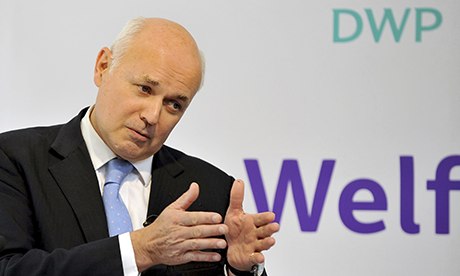Iain Duncan Smith's disability benefits regime, beset by mishaps, not only smears the vulnerable but makes no economic sense

Work and pensions secretary Iain Duncan
Smith. 'George Osborne is right to worry that Duncan Smith lacks the brainpower
– and the basic numeracy – for this job'. Photograph: Ian Nicholson/Press
Association
Another mishap yesterday
rammed into the back of Iain Duncan Smith's pile-up of car crashes, as his
roll-out of new disability
benefits was delayed, yet again. His Work Programme and his universal credit
are in intensive care, now joined by his tougher personal independence payments
(PIP) for disability.
George Osborne's first list of cuts in 2010 included a random cull of 20% of those on DLA. There was no rhyme, reason or research to suggest a fifth of disabled people should do without help, but plenty of malevolent accusations poured out from Duncan Smith's team. He says DLA is "spiralling" out of control as the 3.1 million claimants is triple the number since it was introduced in 1992. Without "reform", one in 17 citizens will draw it by 2018. Tories point to this "inexplicable" rise in the number of disabled claimants despite improved medical care, which at first sight does indeed look odd.
But the DWP knows perfectly
well how this growth is explained. DLA is only paid to those of working age, but
when they retire they keep it, so as more people since 1992 move into
retirement, numbers rise fast. There has been no change in numbers with physical
conditions, despite a larger population; back injuries have declined with the
decline of heavy industry. There has been a real growth in numbers with learning
disabilities: more premature babies survive but with disabilities, while those
with Down's syndrome no longer die young. More people with mental illness claim
DLA now, following changes in case law: there has been no increase in mental
illness, with
7% of the population seriously ill enough to be receiving treatment, yet only 1%
claim DLA. Psychosis is the commonest DLA diagnosis, hardly a trivial
condition. This pattern of disability mirrors the rest of the Organisation for
Economic Co-operation and Development countries, with nothing exceptional
here.
Beyond need for savings,
there is no justification in cutting an arbitrary 20% of people from the DLA
they need for transport and care. The honest approach to this brutality would be
to say money must be saved and to apologise to victims instead of finding
devious ways to blame them by implying one in five are frauds. Duncan Smith has
overseen an unscrupulous smear campaign using these bogus "spiralling out of
control" figures, together with well-placed anecdotes of cheats caught running
marathons. (His own figures show a fraud rate of just 0.7%.) This is his one
success: public sympathy has turned sour, so now the genuinely
disabled report frequent and growing public abuse.
Despite winning the public opinion war so far, the government knows the politics of cutting disabled people off from benefits is perilous. No surprise they decided to go slow this week – and even less surprising that existing claimants have been parked until after the election. Labour is well aware of that nasty legacy. Labour will apologise for lacking the money to restore all benefit cuts – but how can they go ahead with a new £2.2bn cut for half a million people within months of arriving in office? Labour's disability commission is seeking a way round this with savings elsewhere. Why, for example, do so few employers pay statutory sick pay as they should? Instead they tip the sick onto the public purse. Why are so many employers, especially large retailers, avoiding all obligations by hiring most low-paid staff only for 16 hours, below the national insurance threshold? If all but tiny businesses paid NI on part-timers, the savings could avoid this cut.
Britain is quite generous
to the disabled, paying
more than France but less than Scandinavia. What's exceptional is that we
give help in cash so people can choose their own transport or care, while other
countries give more in direct services. That makes our benefits look large, an
easy target for those who want them cut. The families regularly paraded in the
tabloids for drawing large total sums almost always have one or more disabled
children, paying for extra childcare and transport – but that goes unreported.
Our jobseeker's allowance – the dole – is pitifully low by international
standards, below subsistence
at £71 a week. It's not designed for long-term living, but that's all many
disabled people will draw after these cuts.
Here is the final blunder.
A report this week from 50 combined disability charities will show 9% of those
due to lose their DLA are in work, using it for transport to their job. Over
half will leave their job without that help, so instead of saving £60m from
their DLA payments, the state will have to pay them more benefit while losing
their NI and tax, costing an extra £200m. Osborne is right to worry that Duncan
Smith lacks the brainpower – and the basic numeracy – for this job.
Guardian